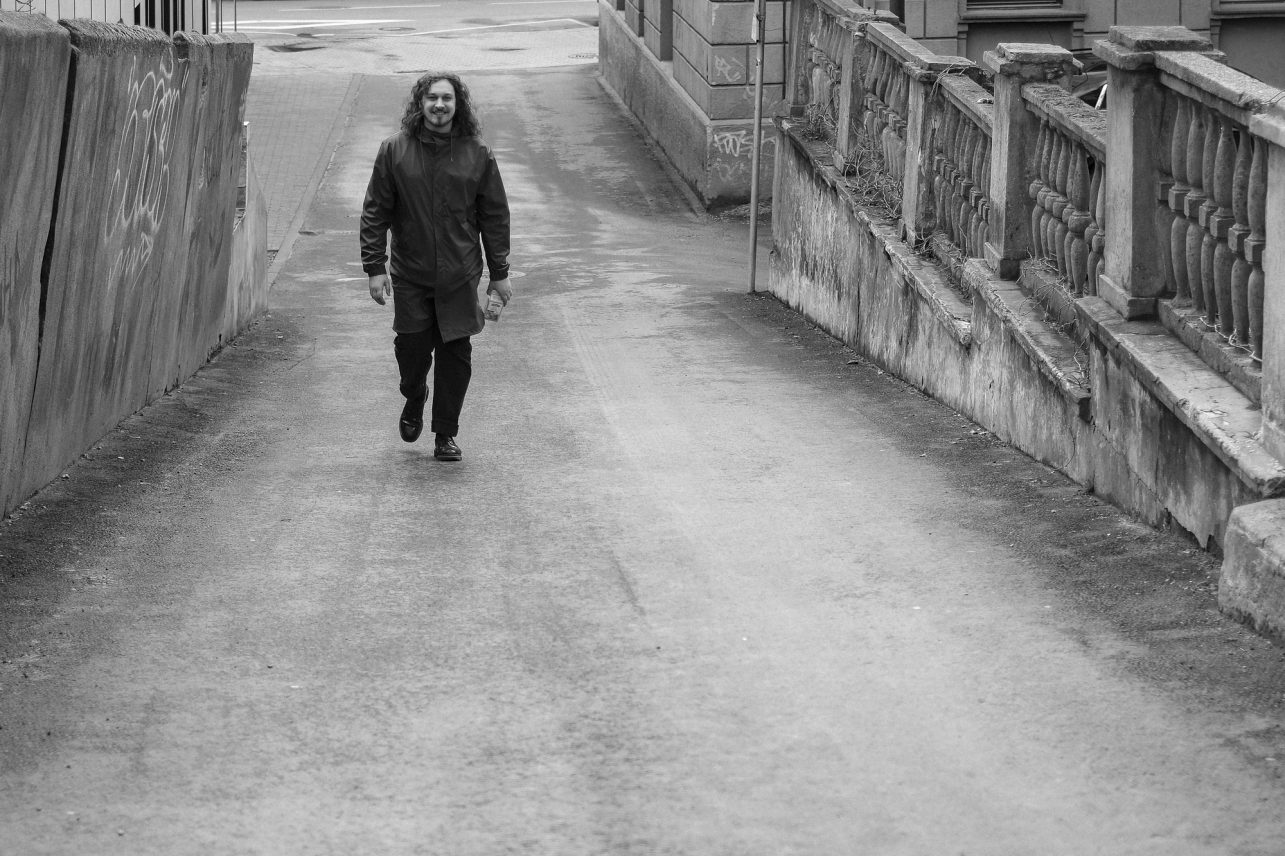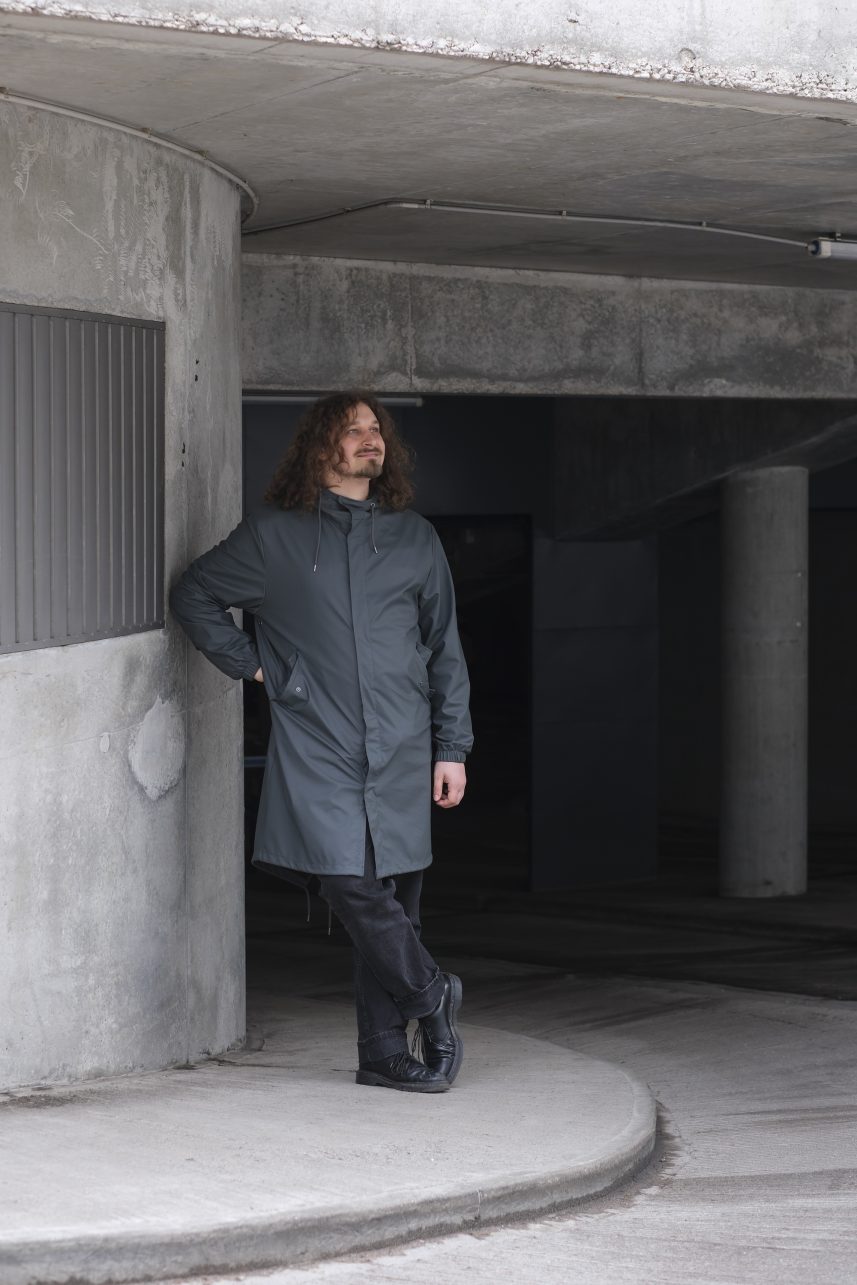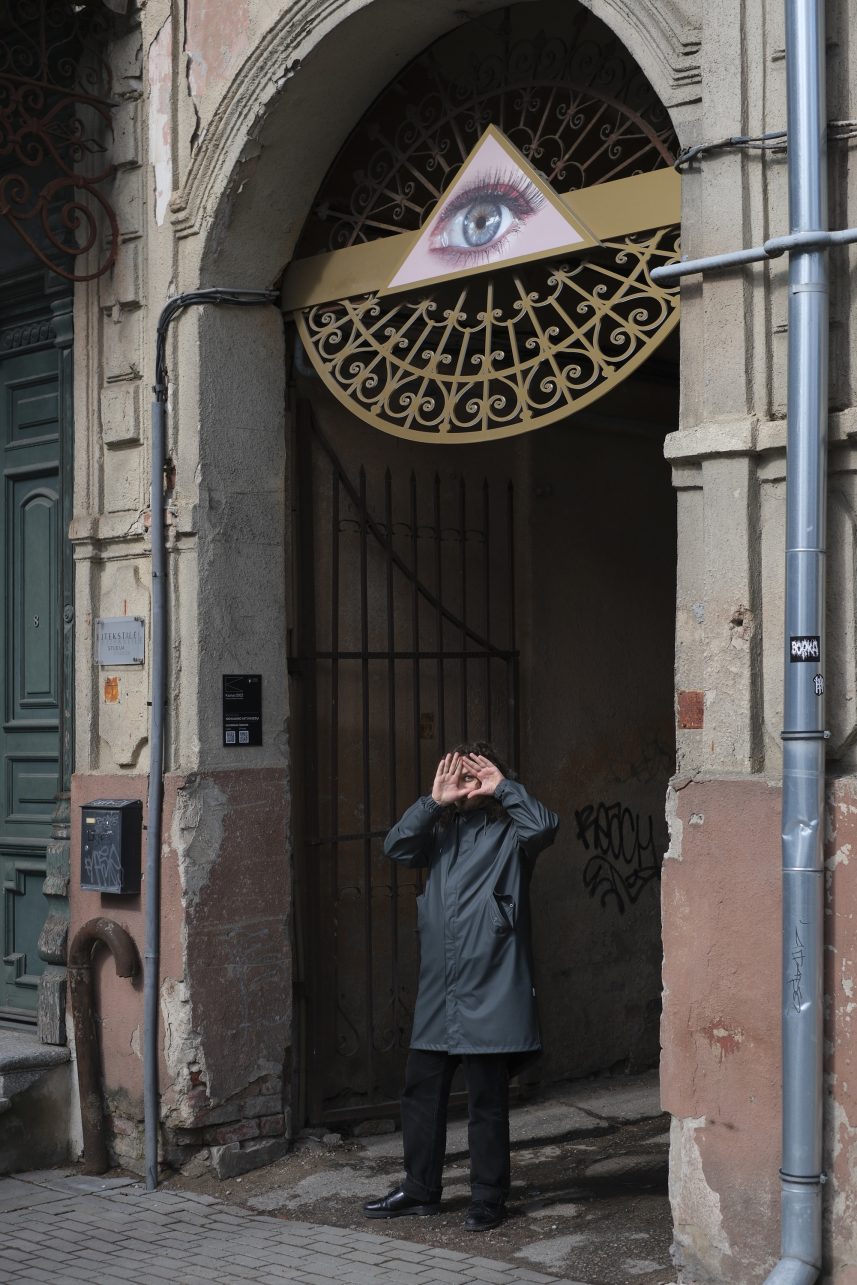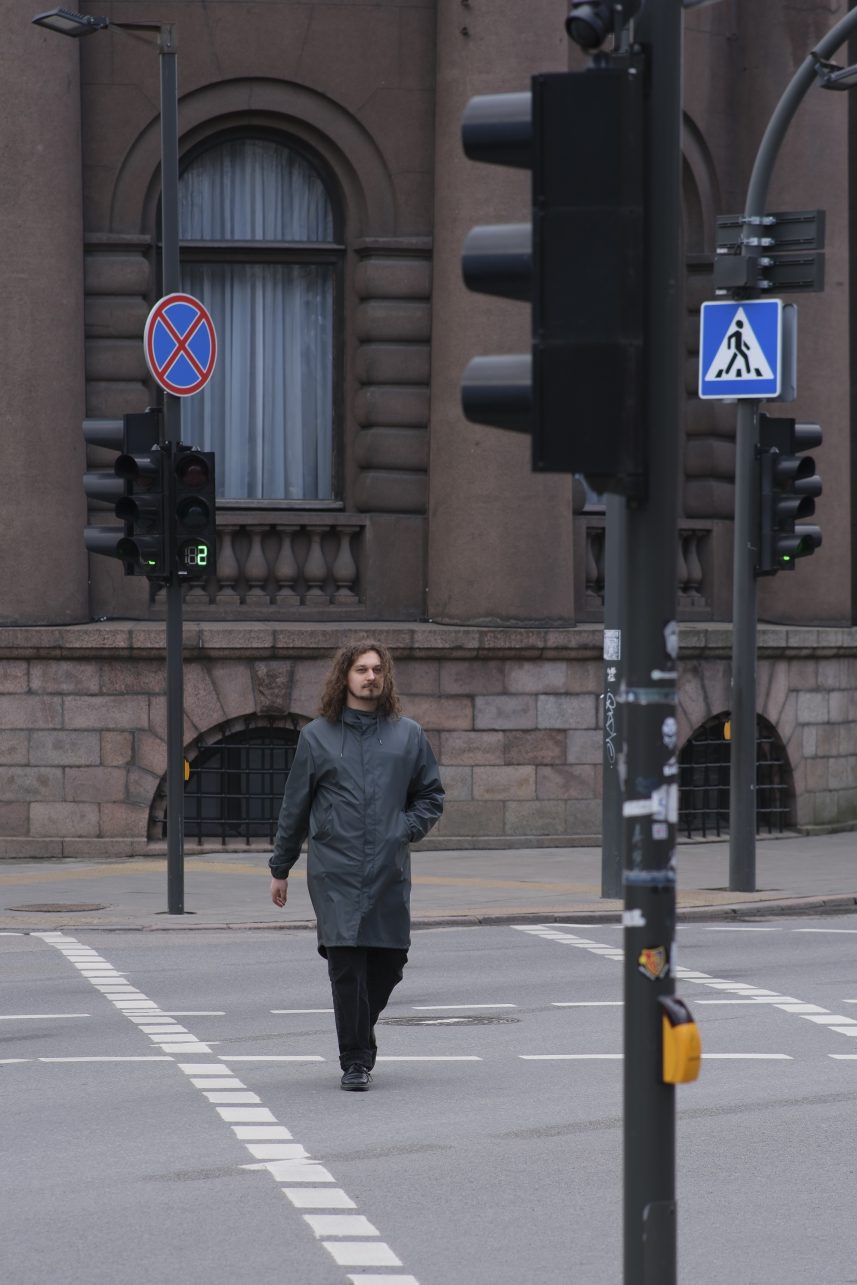“When you’re given a hammer, everything looks like a nail,” – this is how my interviewee, Karolis Lasys, vividly described his tendency to explore various creative fields. Karolis’ work is most often encountered under the pseudonym Eugine Onegin or simply Onegin. By day, he works as an architect, but by night, he spins records, curates music, writes texts, and hosts radio shows. Alongside these activities, he founded Broken Teeth Radio – the only independent radio station in Kaunas. And although Karolis claimed during our conversation that there are no subcultures in Kaunas, I couldn’t help but wonder whether a part of the city’s alternative scene was actually sitting right in front of me.

Karolis, why does Kaunas need an independent radio station?
Many big Lithuanian cities had or still have independent radio stations, but Kaunas does not, and that is quite strange. For me, it’s a kind of hint about the general cultural environment of Kaunas and its ailments. I noticed a vacuum. For example, Radio Vilnius airs mostly from Vilnius, but you can often hear people from Kaunas on it, for example, Lizdas Sound Institute curates a monthly show there; I also find Kaunas people in foreign radio stations scattered all over the world, so we try to reach out to other sound cultures. We seem to live in this city, but we export ourselves elsewhere and lose the opportunity to form a unified sound culture in Kaunas.
Tell us about the founding of the radio station.
Broken Teeth Radio started a few years ago as noïse radio. Initially, it was a radio platform created to meet the need for broadcasting programs and DJ sets – it was even used by Kaunas Artists’ House and the Sapfo festival. Since I was familiar with the technical aspects of setting up a radio station and had experience with Lithuanian radio, I thought, why not try doing it myself? My radio has been broadcasting non-stop since 2022, and there is always music playing. A lot of it is automated, so radio curation is basically about curating music and putting it on the program grid.
How do you select content?
I don’t want what is commercially available, easily replicated. If such a program could exist in six different places, then it is not suitable for me. I gravitated toward what is localized or untested. For example, we had a podcast about rocks (Ant akmens, hosted Paulius Večeris-Vecera), which started with crystals and ended with physics and the international political situation. I want people to bring with them what really intrigues them, and I can provide a channel for that. I want to think about DJ sets as a narrative, not just a functional performance.
How did the name of the station come about?
The name is kind of a joke. I wanted to mention something that would reflect a part of me, and I have a chipped tooth due to unfortunate circumstances [shows tooth].
Must be dentists’ favorite.
The Hospital of Lithuanian University of Health Sciences, Kaunas Clinics, listens to it every day and picks its clients.

What was the evolution of the music you listen to?
I started with indie variations, I liked rock, and over time, something would randomly pop up in my life, like a Deep Purple CD or meeting someone who liked punk rock. It’s a complex process. For a long time, I was only listening to electronic music, but now my taste has expanded again, and I listen to everything from German new electronica variations to classical music. The range is wide, all the music is a bit similar, but also a bit different – these are the stories that artists choose to tell. Music is a hammer, and we are all hammering the same nail, just in different ways. Marshall McLuhan once said that the medium itself is the message, and it is the properties of the medium – or genre in this case – that determine how and what messages we perceive in the work. It also conveys the territories of the genre and sounds.
What other radio stations do you listen to?
I listen to Rinse FM, Cashmere Radio, Fade Radio, Refuge Worldwide, and outside the continent I listen to Internet Public Radio from Guadalajara in Mexico and Seoul Community Radio from South Korea. For over a year I have been hosting a series of programs on Radio Alhara in Palestine. I have found music from this diaspora that is not heard much in Europe. They use the radio as a platform to build solidarity, to broadcast their culture, which is so actively being destroyed. Political themes are relevant to me, there is no art without politics, maybe even no action at all that does not have some political weight, especially in the case of community radio. After all, they started with a political expression like piracy, actively breaking the law, showing the world that you exist.
Karolis, you are also a DJ.
I used to DJ more when I was a student, because it’s good money in your pocket, especially when you’re doing your master’s thesis and you’re eating only pasta. At the same time, it was a counterbalance to the rational daily routine of studying architecture. Playing became a sensory, emotion-based activity, allowing you to broaden your perspective, generate something new, and get ideas and universal knowledge. Now I play less often, if I played every weekend, I would burn out quickly. Besides, I don’t just play music for the sake of let’s have two beers, let’s have a laugh, dance, and go our separate ways. It’s communication – I communicate with sounds, with feelings, and I want to explore things when I play and create, I want to create an experience.
Which medium is easier to speak through – music or architecture?
Architecture is a hyper-rational thing, because it’s inevitably a lot of money, investment, social responsibility, and if I were to create architecture purely intuitively, I’d be afraid that it would become a modernist self-aggrandizement, a God-complex, it would be unethical. But music is completely intuitive, through music I talk about feelings, but also about what we don’t say, collective experience. There is no clear answer, but if it wasn’t for both, I probably wouldn’t be talking at all.

Alternatives and experiments. What do these terms mean to you? What is an experiment in an alternative?
Alternative is a complex word, and there are two ways of looking at it. Alternative as anti-pop culturally in music and alternative as a community. In Kaunas, there are no more subcultures. They usually exist in obscurity, are specific and niche, some people like it, they jump in and form a community. Partly, there is no longer such a need; social networks have emerged, a lot of things have become mainstream, now we are accumulating social capital by advertising it, projecting our value. There is no room for alternatives.
I, somewhat naively, want to say that I am not involved in the mainstream. The alternative is a kind of self-fulfilling prophecy leading to destruction: we don’t want to treat this kind of work as work, we want to separate ourselves from pop music, which has to make money and be relevant. So, the alternative often disappears when people get tired of it. However, paradoxes are inevitable, and I’m navigating in that reality. I am active on social networks because I don’t know how else to mobilize people, except by hand, which is probably much more effective. I like to think idealistically, but in practice it’s completely different. It is the same with the alternative. It can’t exist in subcultures, because they don’t exist anymore, so you must go to the pop culture side and put your name out there, otherwise you’re screaming into the void. I respect people who create only for themselves, but I can’t do that myself; I want to share, to be part of a community.
What places in Kaunas are important to you?
The closest to my heart is Godo because one of the bar’s founders, Agnė Urbutė, was the first person to believe that I could curate music. My first gigs happened there, and if not for this place, my musical debut would have been completely different. There were many doubts about the “legal” activities in the former radio factory – it’s an interesting cultural catalyst, and many good raves used to take place there. S11 is a non-commercial place, but now there’s a bit of a pause there. I really liked Haxan club, (RIP). Lizdas Sound Institute is also close to my heart. Friends from other cities say that Kaunas is lucky – it’s almost the only place in the city that brings together a large cultural mass, embraces a broad scope, and allows itself to experiment more. For a long time, I’ve been a fan of O kodėl ne? I’m also really happy that Kultūra has welcomed music back into its space.
You’ve made a life out of different activities – architecture, music, writing, technology. How do all these parts fit together?
When you’re given a hammer, everything looks like a nail – the curse of Sisyphus, which I invented for myself. When you’re a curious person and you’re interested in creating, exploring, talking, making connections, and generating ideas, then you want to taste everything. Time passes, you see which hammer you’re best with, and then you narrow yourself down until finally, after trying a lot of things, you realize that everything in creativity is universal.
It will be interesting to see what the next nail you hammer will be. But still, why did you choose the name Onegin?
Maybe it was around 2017 when I went to a play at the Russian Drama Theatre (now the Vilnius Old Theatre). They were showing Pushkin’s Onegin. People told me that there were always subtitles at the theater, but for some reason, there weren’t any at that time. And I know exactly three Russian words, all of which are swear words. The play was, of course, in Russian, and I understood absolutely nothing. A woman sitting next to me kept glancing over, and finally, she said, “You don’t understand anything, do you? I’ll translate it for you.” This whole situation was so funny – it completely changed my experience of the play. Later, when I was coming up with a pseudonym and trying to reflect on the music I was creating, I remembered this moment. I thought about how, in a way, I’m a bit of an absurd character myself, trying to push into this field. And then it just stuck with me: Eugene Onegin, the poor guy searching for pure culture and burning out like Icarus.
We talked about the fact that culture is inseparable from politics. How do you motivate the decision to keep the name of a character from a Russian play as your pseudonym, especially in today’s context?
I thought about it a lot: What do I represent, and what are the alternatives? I decided that it’s fine. Through that character I’m talking about a certain absurdity of creation, about the world as a theatre of the absurd, where we are all characters, so let this be part of that absurdity.
instagram.com/brokenteethradio


